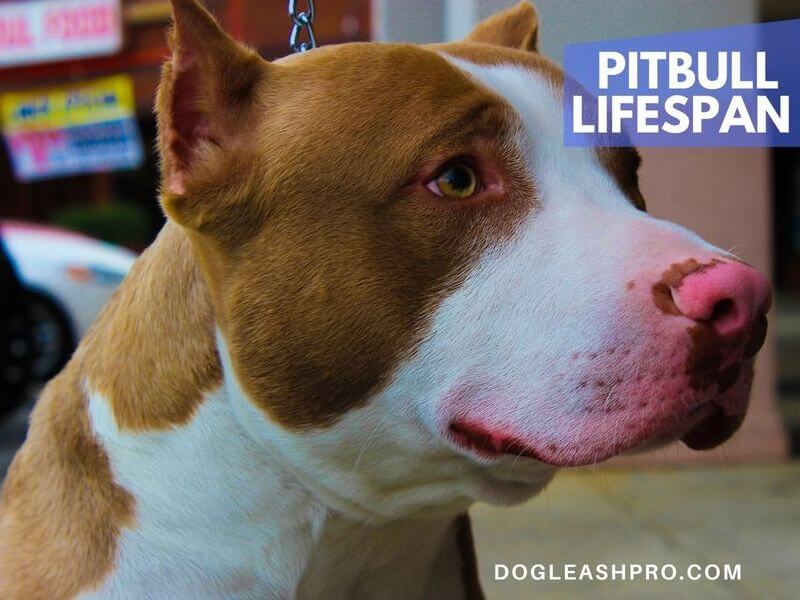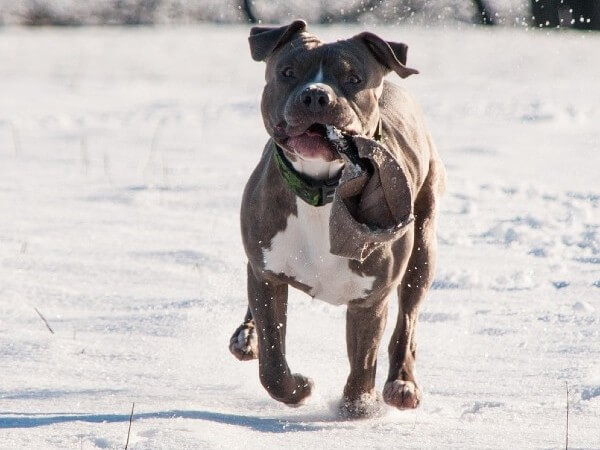
You’re probably reading this article because you already have a Pitbull or are thinking about getting one. In the U.S., 20% of dogs are Pitbull-type dogs and they are known to be a strong dog breed.
In fact, they are more popular than other strong breeds such as Boxers, Great Danes, Huskies, Rottweilers, German Shepherds, Doberman Pinschers, and Mastiffs. In the US alone, there were about 4.5 million Pitbulls as of 2019. This means that Pitbull-type dogs make up almost 6% of all dog breeds.
So you may be wondering: How long do Pit Bulls live? The Pitbull breeds lifespan is typically 10 to 14 years. Depending on various factors, including breed-specific health problems, lifestyles, genetics, diet, and physical activities one can expect this medium-sized dog to live up to 10 to 14 years.
Whether you’re a dog breeder who is looking to breed your male dog, a current dog owner, or will become one soon, the information below will answer all of your most pressing questions about Pitbulls.
Table of Contents
Interesting background information about Pitbulls

Many have mistaken the term “Pitbull” as a breed, but it is actually a generic term used to describe a category of medium-sized dog that has the “bully-type” physical traits such as the shortened nose, boxy head with wide forehead, muscular yet stocky body, and short body size.
According to AKC and UKC breed standards, there are four types of Pitbull breeds.
They are:
- American Bully
- American Staffordshire Terrier.
- Staffordshire Bull Terrier.
- American Pit Bull Terrier.
It’s very common for there to be a mix of these breeds.
What’s beautiful about Pit Bulls is that they come in different colors. Some Pitbulls are brown, spotted, white, and black while other Pitbulls are red (bright brown) or blue (silvery gray).
READ ALSO: White Pitbulls (Complete Guide)
It’s not surprising if you see Pitbulls with a combination of these listed colors.
How long do Pit Bulls live for?
Pit Bulls can live for as long as 16 years.
However, there are many factors that can decrease the number of years Pit Bulls can live, including genetics, health problems, whether the Pitbulls are outdoor dogs or indoor, and if they have been spayed or neutered.
Let’s begin by going over the average lifespan for different Pitbull types.
What is the average lifespan of a Pitbull?
The average lifespan of a pitbull is between 12 to 15 years of age. Here, we are talking about domesticated indoor Pitbulls.
Let’s dive a bit deeper and find out the average lifespan of each particular type of Pitbulls:
- American Bulldog (60 to 110 pounds) has an average lifespan of 10 to 16 years.
- English Bull Terrier (50 to 80 pounds) has an average lifespan of 11 to 14 years.
- Staffordshire Bull Terrier (25 to 40 pounds) has an average lifespan of 12 to 14 years.
- American Pit Bull Terrier (35 to 65 pounds) has an average lifespan of 12 to 16 years.
- American Staffordshire Bull Terrier (25 to 40 pounds) has an average lifespan of 12 to 16 years.
Life expectancy is closely linked to a dog’s size. This means a smaller dog breed will usually live longer than a giant dog breed.
For instance, a small-sized Chihuahua that weighs around 6 pounds will live up to 20 years while a giant 170-pound Mastiffs only has a lifespan of up to 12 years.
That’s a 6 years difference!
RECOMMENDED: Pitbull Chihuahua Mix (Chipit Complete Guide)
The reason for this is because large dog breeds age faster than small dog breeds.
Fun Fact: Both Pitbull puppies and senior Pitbull dogs are more likely to breathe fast while sleeping and this is actually normal. If you have a healthy middle-aged Pitbull that is breathing fast, make sure to consult with your vet to detect any health issues early.
How long do Pit Bulls usually live?
As you can see, Pit Bulls usually live up to 16 years, but it also depends on each particular type of Pitbulls. The average lifespan of each type of Pitbulls will give you an idea of how long Pit Bulls usually live.
Let’s specifically discuss what may be affecting your Pitbull dog lifespan.
Factors affecting the average lifespan of Pitbull

Here are some of the factors that affect the average lifespan of a Pitbull dog.
Pitbull health problems
Pitbulls, like other dog breeds, are susceptible to certain health problems. These potential health problems can affect the Pitbull lifespan:
1. Heart disease
One of the common health problems found in Pitbulls is heart disease. This disease is usually inherited and unfortunately, you may not see any symptoms until it is too late. Here are common types of heart disease affecting Pitbulls:
- Aortic stenosis.
- Irregular heart rhythm.
- Valve malformations.
We recommend that Pitbull owners stay proactive and bring their Pitties in for regularly scheduled checkups at the vet to detect the heart conditions earlier before it may be too late. Early detection is key!
2. Hip dysplasia
If you have Staffordshire Terriers, be aware that they may be prone to hip dysplasia since it is an inherited health issue. When their hip is not formed properly during growth, it can lead to constant pain and arthritis.
You will know that your Pitties have hip dysplasia if they have the following:
- Lameness in their hind legs.
- Have trouble climbing up the stairs.
- Difficulty running.
- Have a hopping gait.
- Limping around.
Knowing that hip problems are common in Pitbulls, we recommend that you bring your Pitbulls in for regular checkups to detect this hip condition early.
3. Skin conditions
Skin disorders are also common in Pitbulls. There are several skin conditions that Pitbulls are prone to, namely:
- Skin cancer: Melanoma.
- Itchy skin due to allergies.
- Skin tumors: Mast cell tumors.
Regular grooming is crucial as during these grooming sessions, you may be able to spot any skin problems your Pitbulls may be having.
During grooming, it’s best to have their ears cleaned to prevent skin allergy from pollen, grass, or ticks.
Since Pitbulls have short hair, we recommend that you provide them with shades in sunny areas or have them stay in shaded areas so they don’t get sunburns.
During the summer, make sure you have a canine-friendly bug repellent ready. If your yard has a bug or mosquito infestation, then it may affect your Pitbulls.
Pitties that love to roll in the yard may get itchy skin from the bug bites or mosquito bites and they may scratch until a cut occurs.
READ NEXT: Engorged Tick Fell Off Dog (Here’s What To Do!)
If you see your Pitbulls itching constantly, consult with your vet to find out what treatment would help with their itchy skin or which skin ointment would help soothe their skin and cut.
At the sight of any skin issues or abnormalities, it’s best to visit your vet right away to avoid a serious case as skin problems or skin cancer is hard to cure and very painful for our Pitties.
In some cases, skin issues can result in sudden fatality.
4. Knee issues

Pitties are prone to knee problems because they are strong active dogs that love to run around whenever they can.
However, their active lifestyle can put stress on their knee joints and or even put stress on their cranial cruciate ligament and can possibly cause a torn ACL.
Early detection will allow treatments such as surgery to be done as soon as possible to fix this torn ACL or torn connective ligament. If it isn’t taken care of right away, the other knee could be impacted.
5. Cataracts
During the routine checkup, you can ask your vet to check your Pitbull’s eyes. Since Pitbulls are prone to cataract conditions, early detection is crucial. Cataract is when there is excess protein buildup and surgery is needed to remove this.
Be aware that Pitbull puppies can have cataract conditions as well. It’s called juvenile cataracts and it usually occurs before they turn 6 years of age. While this condition is usually inherited, it can also be developed.
Cataracts can be developed by the following conditions:
- Diabetes.
- Hypocalcemia.
- Uveitis.
Pitbulls are also prone to inflammation and infection of the eyes. If this is the case, then your Pitties may have corneal ulcers.
6. Thyroid disease
Another common health problem in Pitbulls is thyroid disease. When their thyroid glands are not making enough thyroid hormones, it can affect their weight and skin. For instance, the Pitbulls may gain weight or develop skin problems as a result of thyroid disease.
During the regular checkup visit, your vet will perform a physical checkup in addition to blood tests to see if your Pitties may have this disease. If so, your Pitbull may have to take thyroxine to combat the disease and would have to take this for the rest of his life.
If left untreated, there may be harmful consequences such that he will have behavioral changes or display aggression.
Outdoor Pitbulls are more likely to get hit by cars
Every year in the U.S., there are unfortunately 1.2 million canine fatalities due to car accidents. As responsible dog owners, we should make sure that our yards are secure and fenced-in, either using a physical fence or a wireless dog fence to keep our Pitties safe.
A dog may not know where he is if he escapes your yard so be sure that he wears a collar with an identification tag.
This hits close to home because we were on a walk one evening. As we approached a T intersection, we saw a senior Pitbull crossing the road slowly looking lost. Luckily, we were able to guide him away from an oncoming car approaching the intersection.
When it was safe, we knelt down to find the ID tag on her collar. Fortunately, the address on the ID tag told us that her owner’s house was a block over. We went up to the house and found the owner crying over the news that we found her elderly Pitbull.
In this case, the Pitbull was saved but this could have easily caused a tragic fatality.
Fun Fact: If you have an elderly Pitbull with dementia, one of the unusual behaviors is disorientation. Your senior Pitbull may appear confused or lost in a familiar environment so dog owners should keep an eye out on their elderly dogs to prevent lost dogs.
Outdoor Pitbulls may be exposed to open wounds and cuts. While outdoor Pitbulls do not have to worry about being overweight, they do have to search for their food and as a result, they may not get a well-balanced nutritious diet.
It is normal for Pitbulls to run about as a way to explore their environment since they are an energetic dog breed. However, their safety is very important. As dog owners, we can help to prevent harmful situations that may unexpectedly cut their life short.
Strong genetics

If you’re curious about the average pitbull lifespan or simply your own precious Pitbull, then a way to know is by finding out how long his parents, grandparents, or other relatives have lived.
Most likely, you got your Pitties from a breeder. If this is the case, ask your breeder to learn how long your Pitties family members have lived.
Unfortunately, if you got your Pitties from a rescue organization or shelter, finding out how long they may live till can be a bit tricky since there may not be an ancestral record.
While you can’t control that, you can control your Pitbull’s lifestyle and diet. This will ensure your Pitties live a long life by your side.
When you adopted or rescued your Pitbulls, you may not even know their age! If this is the case, visit your vet as they can guesstimate your Pitties’ age by their eyes, teeth, coat, and heart health.
Spay and Neuter Pitbulls
When a female Pitbull is spayed, there’s no chance of ovarian or uterine cancer. Being neutered or spayed helps to decrease their chances of having mammary cancer.
Additionally, your Pitties are less likely to roam around and escape your premise in order to find their mates since their reproductive hormones are gone. This lowers their chance of brawling with other dogs or animals or getting hit by cars.
How to ensure a long lifespan for your Pitbull
Speaking of living a long life, there are several things you can do to ensure your Pitties live a happy, healthy, and long life.
Here are four ways:
1. Warm, dry and safe space

Providing a safe space for your Pitbull is crucial. Since they have short coat hair, it is best to keep them warm especially if you live in cold climates.
2. Healthy well-balanced diet
Canine obesity is a preventable disease that affects approximately 25% to 30% of the canine population. That’s a high percentage!
Thus, it’s crucial that your Pitbull eats a well-balanced and healthy diet. Use the 90/10 rule to help you decide how much of his calorie count should come from his regular dog food and how much dog treat to give him.
Maintaining a healthy weight will help him live a longer life. Don’t overfeed and avoid underfeeding as well.
If you’re not sure, contact your vet and ask what the best food portion size is as well as the best food options.
To find out if you’ve fed him enough, you can place your hand along your Pitties’ side and then run it across. You should be able to feel his ribs. If you can’t and have to use a little bit of finger muscle to push in to feel the ribs, then he is overeating and gaining weight.
Weight gain can put pressure on your Pitbull’s joints, bones, heart, lung, and liver. At this point, it’s best to decrease his food and snack intake.
Remember that an overweight Pitbull is worse than an underweight Pitbull since the health problems that come from canine obesity can be severe and includes:
- Joint and knee pain.
- High blood pressure.
- Diabetes.
- Heart problem or worsen an existing heart problem.
3. Daily exercise is a must
Pitbulls are active mid-sized dogs so regular daily exercise is crucial. Make sure you are walking your Pitbulls every day. If you have a backyard, allow him to freely run around and play. But be sure that the yard is fenced-in so he is contained within the set boundaries.
Physical exercise has many health benefits for Pitbulls. They include:
- Staying fit and maintaining a healthy weight.
- Helping improve any heart conditions.
- Healthy lungs, liver, and bones.
Physical exercise should come hand-in-hand with mental exercise. Keep your Pitbull’s mind active and sharp by getting him a few brain game toys or chew-proof dog toys. This will help slow down or prevent the progression of canine dementia.
4. Regular veterinary and wellness checkup for your Pitbulls
As mentioned above, taking your Pitbulls to the vet on a regular basis is crucial. It helps them live healthier and longer lives.
A senior dog that is eight to nine years of age should visit the vet at least twice a year. During one of these visits, you can ask your vet if they can perform blood work on your Pitbull to find any potential health problems early and treat them timely.
If your vet finds out that your dog has early signs of particular health issues, they will issue preventative medicine to your pup and diagnose any diseases as soon as they learn of it.
Health issues that are discovered early have a greater survival success rate and the prognosis is much better.
For those who wants to know a Pitbull’s age group by its term and actual age, here it is:
Pitbull age groups (term and years of age)
Puppies
A Pitbull is considered a puppy from the moment he is born to when he is 9 months of age.
Juveniles and Adolescents
From 10 months of age to when he is 2 years of age, your Pitbull is considered a Juvenile and Adolescent. They are now becoming more mature.
Adult or matured Pitbulls
From 2 years of age to 10 years of age, your Pitbull is considered to be an adult. This is the time that they may develop health issues like heart health, dental problems, and weight gain. Make sure you don’t miss any veterinary visits.
Senior Pitbull dogs
When your Pitbulls are 10 years of age or older, they are considered senior dogs. This is when they are a bit slower, not as active as before, and definitely sleep a lot more.
During this time, be sure to visit your vet at least twice a year, especially when he is prone to health problems like joint pain, heart and kidney failure, or dental issues. Routine visits to the vet will detect these problems early and treat them as soon as possible before the condition worsens.
How long do Pitbull mixes live?
The lifespan of a Pitbull mix breed is around 12 to 14 years of age. However, the answer really depends on which dog breed your Pitbull was mixed with and the specific genetic predisposition of that dog breed.
How long do Red Nose Pit Bulls live?
The red nose Pitbull lifespan is roughly on average about 14 years of age. Some red nose Pitbull do live longer – of up to 16 years of age. This dog breed is based on the American Pitbull Terrier.
Red Nose Pit Bulls have a reddish copper nose with a red coat. True red nose Pit Bulls have both a copper-colored nose, a full red coat, and amber or red eyes. They are easily identifiable from other types of Pit Bulls.
How long do blue nose Pitbulls live?
The average lifespan of a Blue Nose Pitbull is about 12 years. This dog breed is called blue nose Pitbull because of its silvery gray-blue nose. Blue nose Pitbulls come from the American Pitbull Terrier.
Average lifespan of Pitbull summary
While we would love our Pitbulls to live as long as they could with us, there are many factors that affect the average lifespan for a pitbull that we can’t control.
The good news is that there are certain aspects that you can control that will provide them with a longer and healthier life.
Be sure to stay in constant communication with your vet and discuss with them how you can help your Pitbulls live a happy and healthy life.
Related Questions
The natural average lifespan is 12 to 14 years for a North American Pitbull.
The lifespan of Pitbull Boxer mix is on average from 10 to 14 years.
The Pitbull Lab mix lifespan is anywhere between 10 to 15 years. If you have a black lab Pitbull mix, then it is also between 10 to 15 years. This dog breed is prone to medical problems that usually affect medium and large dogs.
The lifespan of Pitbull Terrier is between 8 to 15 years.
The average lifespan of a Pitbull Weimaraner mix is between 10 to 14 years.
The average lifespan of a female Pitbull mix is between 8 and 16 years.
The average lifespan of a female Pitbull is 12 to 14 years.
The average lifespan of a bully Pitball is 8 to 13 years.
The average lifespan of a red nose Pitbull is about 14 years.
DISCLAIMER: THIS WEBSITE DOES NOT PROVIDE MEDICAL ADVICE
The information, including but not limited to, text, graphics, images and other material contained on this website are for informational purposes only. No material on this site is intended to be a substitute for professional veterinary advice, diagnosis, or treatment. Always seek the advice of your veterinarian or other qualified health care provider with any questions you may have regarding a medical condition.
Resources:
https://en.wikipedia.org/wiki/Pit_bull
https://www.differencebetween.com/difference-between-blue-nose-and-vs-red-nose-pitbulls/

With over five years of specialized experience as an animal writer, my expertise lies in dog nutrition, health, behavior, grooming, and training. I am dedicated to delivering helpful and informative content that caters to the well-being of our furry friends. My primary goal is to empower pet owners with knowledge and ensure our canine companions thrive in health and happiness. In my free time, I love volunteering at local dog rescue centers.








